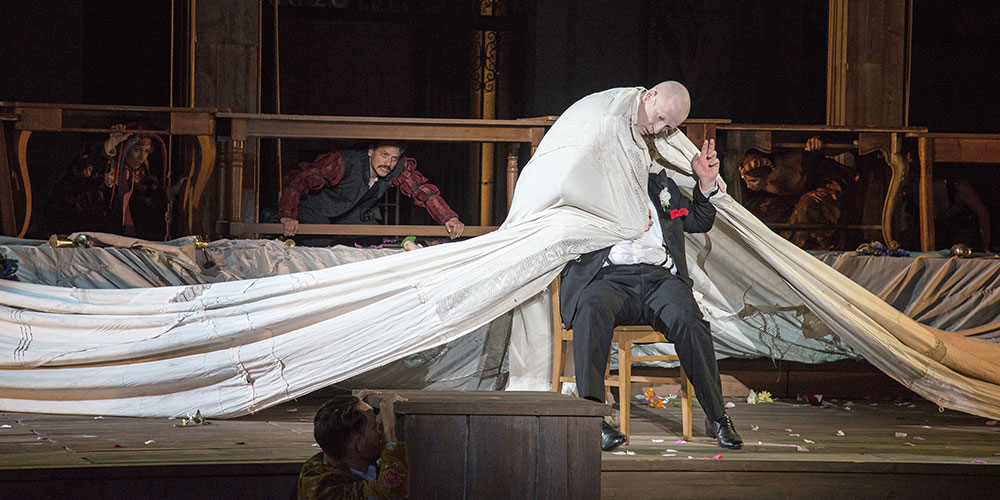“Poet of resonance”: First major Hofmannsthal biography published
The first comprehensive biography of Austrian writer Hugo von Hofmannsthal has been published to coincide with the 150th anniversary of his birth. The extensive volume was created at the University of Basel.
26 February 2024 | Christoph Dieffenbacher
On the table is a book containing over 900 pages. Prof. Elsbeth Dangel-Pelloquin and Prof. Alexander Honold have just returned from readings in Germany and Austria. Their biography of Hugo von Hofmannsthal (1874–1929) has received an almost unanimously positive response from professional circles and the public, they say. The volume on the life and work of the Austrian writer is likely to become a reference work in the future.
Hofmannsthal, who garnered attention in literary cafés at the age of just 17, is regarded as a representative of the symbolism movement and Viennese Modernism with his poems and dramas. Later, following the poetry of his early years, he experimented with new forms of musical theater.
His well-known works include operatic texts such as Elektra, Der Rosenkavalier, and Ariadne auf Naxos, which he compiled with composer and friend Richard Strauss. Hofmannsthal was a co-founder of the Salzburg Festival, where his Jedermann is performed every year to this day. His linguistic criticism is also memorable, for example, when a letter writer’s “words crumble in his mouth like mouldy mushrooms”.
A life’s work of 40 volumes
Large parts of his oeuvre are still largely unknown to the public. The literary works of the Austrian, who also wrote essays and maintained extensive correspondence, include around 1,300 texts, sketches and drafts. Altogether, the works of the Complete Critical Edition fill 28,500 printed pages, spread over 40 heavyweight volumes. The last of these was published just two years ago – by the same publisher, S. Fischer Verlag, with which Hofmannsthal published during his lifetime.
But why is the first major biography only appearing now, almost a century after the author’s death? Dangel says that the material has actually been around for a long time. She speculates that its vast scope may have prevented many people from providing a comprehensive presentation.
There are reasons why the large biographical study is now coming from researchers at the University of Basel: here, at the Faculty of German Philology, important works on the writer and his time were produced thanks to Hofmannsthal experts Prof. Martin Stern and Prof. Karl Pestalozzi.
Life and readings
Dangel and Honold approached the modern classic Hofmannsthal in two ways during their more than three years of work: while she traced Hofmannsthal’s living environments and literary development, he devoted himself to selected works under the title “Readings”. They both claim that the biography displays the writer’s versatility in all its fullness. He was constantly starting new projects, resulting in a large number of text fragments being found in his estate.
The biography also reveals Hofmannsthal’s emphatically cooperative way of working: according to Honold, he was one of the first to maintain “productive networks” with other artists and cultivate friendships. Dangel also calls Hofmannsthal a “poet of resonance”. Equipped with great linguistic sensitivity, he also experienced depressive phases and writer’s block.
Changes, transformations, upheavals
In terms of his attitude, Hofmannsthal was more than just a traditionalist mourning the fall of the Habsburg Empire and failing to cope with the new circumstances, as has been long assumed, according to Honold: “Our biography clearly contradicts this picture.” After the First World War, the writer adapted well to the changes and in many cases also broke new artistic ground.
According to the two authors, the title of the biography, Grenzenlose Verwandlung [Limitless Transformation] is intended to encompass all this: the political upheavals of the time, the fragmentary nature of his entire oeuvre, and the constant crossing of genre boundaries into visual art and dance. The title, however, is also intended to resonate with the personality of the writer, who continually reinvented himself. “Only in transformation can we endure our lives,” Hofmannsthal once wrote – in one of his comedies.




